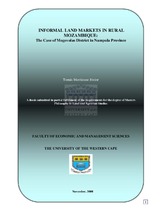| dc.description.abstract | The challenge of alleviating poverty, especially of the rural poor, is a universal one. Mozambique is also faced with this challenge as well the challenge of redressing the inequality exacerbated by civil war. Among the many strategies suggested for addressing poverty is improving poor people’s access to land. In Mozambique, all land is owned by the state, yet informal land markets do exist. A theoretical review of the models on informal markets in developing countries reveals that economy of rural family depend greatly on land resources, and that often formalisation of land markets leads to land concentration and speculation rather than to the promotion of economic development. The overall objective of the study was to analyse the economic, institutional and social dynamics and determinants of informal land markets in rural Mozambique and how they impact on the livelihoods of poor people. Due to the largely unexplored nature of the topic, this study is exploratory and descriptive in nature. Research methods included a combination of quantitative and qualitative methods. To achieve these objectives, a strategy comprising two approaches was used. Firstly, a theoretical review was undertaken, to discuss both international and African debate on informal land markets models with regard to different views on Mozambican informal land markets. This theoretical review also covered the political economy of land in Mozambique. Secondly, empirical evidence was systematized in the form of a case study of the perceptions of determinants on informal land markets that was undertaken in Mogovolas district. The lack of clear policy regarding the informal land market in Mozambique produced a complex range of problems, between local people, between locals and new investors, between new investors, and between all these groups and the state. The large majority of smaller localised conflicts were, and continue to be, resolved by traditional authorities and local social-control mechanisms. Conflicts between local people and investors have proved much more complex. The role of the state has been unclear from the start and the state is still dysfunctional due to a lack of transparency, inefficiency, and corruption in management of land.</p> | en_US |

